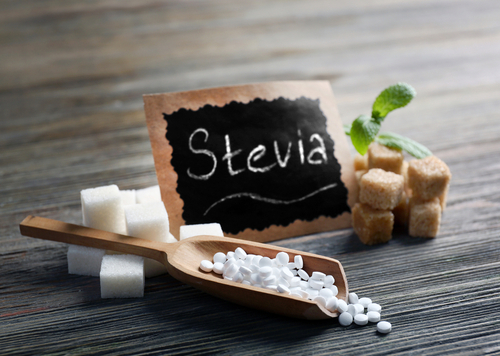Project Description


Dimitris Grigorakos
Dietitian – Nutritionist PhD
Excess consumption of refined sugars, especially sucrose (table sugar), promotes a positive energy balance (i.e. the intake of calories exceeds the consumption of calories through physical activities), resulting in weight gain.
In a society where maintaining a healthy caloric balance is a challenge for more than half of the population, non-caloric sweeteners offer hope to those who want to avoid the diseases and adverse effects related to the excess consumption of sugar.
Unfortunately, artificial non-caloric sweeteners are linked to increased risk of excess caloric intake and inability to achieve or maintain a healthy body weight, while they offer no health benefits.
On the contrary, a significant number of scientific data support that the consumption of the leaf extract from the plant stevia (Stevia rebaudiana Bertoni), a natural, non-artificial, zero calorie sweetener, is effective in promoting human health and is safe.
This extract contains several sweeteners, including stevioside (300 times sweeter than sugar) and other substances with similar sweetness potency.
Stevia comes from Paraguay and Brazil and is used widely today in Asia and South America, while it has gained the attention of many food and drink multinationals. Japan started trading in stevioside as a sweetener since the 1970s, while chemical sweeteners have been banned and replaced by stevia. (Jocelynn E. Thomas, 2010)
Since then, the plant has started being cultivated in other countries, including China, Malaysia
, Singapore, South Korea, Taiwan, Thailand, Paraguay, Brazil, USA, Canada and Europe (Midmore DJ, 2002).
In 2006, the World Health Organization (WHO), in partnership with the UN Food and Agriculture Organization (FAO), announced that the acceptable daily intake (ADI) of stevioside is 5 mg/kg of body weight. (JECFA, 2005)
Benefits
- Stevia is a natural sweetener and does not contain added chemicals.
- As opposed to sugar, fructose and other sweeteners, stevia is safe for diabetics, as it does not affect the blood sugar levels and does not contain any calories.
- Stevia is natural and compared to other artificial sweeteners, it does not have neurological or renal side-effects.
- Stevia has antifungal and antibacterial properties, apart from all its other beneficial properties. It can be safely used in herbal medications, energy drinks for diabetics as well as everyday use products, such as mouthwash and toothpaste. (S. K. Goyal, 2010)
- It may replace sugar in sweets, coffee and other beverages.
- Other benefits of stevia include: diabetes control, weight loss, blood pressure regulation, cancer prevention, reduced cholesterol levels and mouth hygiene. (7 Impressive Benefits Of Stevia, 2018)
So, the natural sweetener from the plant stevia is the ideal choice for people with diabetes mellitus, as well as people who want to lose weight, without the damaging chemical additives of artificial sweeteners.
Bibliography:
- 7 Impressive Benefits Of Stevia. (2018, May 15). Organic Facts.
- JECFA, J. F. (2005, June). Expert Committee on Food Additives. Steviol Glycosides [Addendum to stevioside]. In: Safety Evaluation of Certain Food Additives: Sixty-third Meeting of the Joint FAO/WHO Expert on Food Additives. Food and Agr.
- Jocelynn E. Thomas, M. J. (2010). Stevia: It’s Not Just About Calories. The Open Obesity Journal, σσ. 101-109.
- Midmore DJ, R. A. (2002, August). A new rural industry – Stevia – to replace imported chemical sweeteners. Rural Indutries Research and Development Corporation.
- K. Goyal, S. R. (2010, February). Stevia (Stevia rebaudiana) a bio-sweetener: a review. International Journal of Food Sciences and Nutrition, σσ. 1-10.




